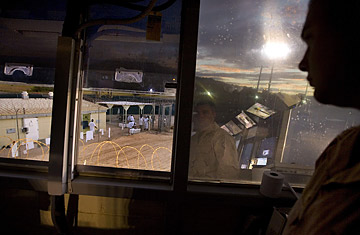
A sentry stands watch in a guard tower at the Guantánamo Bay Naval Base detention center
When Vijay Padmanabhan worked as the lead State Department attorney on detainee issues, the answers he got from foreign capitals about the 17 Chinese Muslims in Guantánamo was almost always the same. Dignitaries told Padmanabhan again and again that they could not take the men, who belong to China's Uighur (pronounced WEE-gur) ethnic minority. There is an active Uighur separatist movement in China, and elements of it have been accused of terrorist acts in the People's Republic. The U.S. has not admitted any freed Guantánamo prisoners onto its soil, Padmanabhan was reminded by officials from countries around the world. So why should any other nation do so — especially when doing so could sour relations with China?
"No country has agreed or even suggested that they are thinking about accepting these people for resettlement," says Padmanabhan, who recently left the State Department to become a visiting assistant professor at the Cardozo School in New York City. "China is a big country on the block, so people don't like to do things that anger the Chinese government." (See here for pictures from inside Guantánamo.)
The 17 Uighurs are trapped in a seemingly irreconcilable dilemma. The Bush Administration first cleared them for release in 2003. The men had been rounded up by bounty hunters in Pakistan in the months after 9/11 and sent to U.S. authorities, who eventually determined that they posed no terrorist threat. The leadership in Beijing, however, suspects the Uighurs are part of a guerilla separatist movement based in the far west of China and wants them handed over to Chinese authorities. U.S. law forbids delivering individuals over to countries where they may face mistreatment. And so the Uighurs have sat in Guantánamo, essentially homeless, for years.
But their time in prison may be coming to an end. This week the U.S. Court of Appeals for the D.C. Circuit in Washington heard oral arguments over the fate of the Uighurs, who were ordered released by a lower court last month. The oral arguments marked another step along the case's path toward the Supreme Court, where it will likely land early next year as President-elect Barack Obama takes office. Obama, who has vowed to close Guantánamo, will probably release most of the roughly 225 prisoners held there and find a way to try a select few who are thought to be hard-core al-Qaeda operatives too dangerous to let go. Those freed will probably be returned to their home countries — except for the Uighurs. With no country willing to take them, the incoming Obama Administration will probably have to settle them somewhere in the United States and face China's anger.
"I expect the Chinese will do something," says Bonnie Glaser, an expert on China at the Center for Strategic and International Studies. "It's embarrassing to the leadership, mostly for domestic reasons, that we are refusing to send these people back to China."
What exactly China will do in retaliation is unclear. Glaser and other China watchers do not expect a major backlash that would derail relations between Washington and Beijing. Glaser said Chinese leaders would likely react to the Uighurs' release in the U.S. as they did to the announcement in October by the Bush Administration of a $6.4 billion arms sale to the Taiwanese, a much more troublesome issue in the eyes of China's government. That deal prompted Beijing to curb, but not cut, military contacts with Washington and brush off some arms-proliferation talks. All in all, the Chinese response amounted to a diplomatic harrumph — the reaction China will probably offer if the Uighurs go free in the United States.
The State Department continues to press other countries to take in the Uighurs, as Albania did with five other Uighur detainees in 2006. But Albania has apparently decided that taking in more Uighurs now is too burdensome. And Padmanabhan doubts whether any other countries will come around and solve the problem before the new White House takes shape in roughly two months. "There are no signs of hope," he says.
